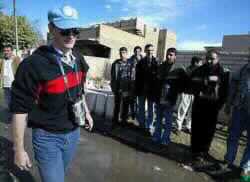U.N. arms experts paid surprise visits to the homes of two Iraqi scientists in Baghdad on Thursday, in their first foray into private residential quarters in search of Iraqi weapons of mass destruction. On the eve of the 12th anniversary of the 1991 Gulf War , witnesses said an International Atomic Energy Agency (IAEA) team arrived unannounced in Baghdad's Ghazaliyeh neighborhood and went into a building where Faleh Hassan, a scientist who heads al-Razzi State Company, lived.
Al-Razzi Company was founded in 1997 by Iraq's Military Industrialization Commission and employs several people who were involved in Iraq's past nuclear program.
The company was officially involved in laser development and military projects, a U.N. spokesman said when IAEA inspectors visited its facilities in December.
The inspectors also went to the flat of nuclear scientist Shaker al-Jabouri in the same block. Neither man was home, so the inspectors waited outside their apartments while Iraqi officials brought them back from their offices.
Once they returned, the inspectors entered the scientists' flats. It was not clear if the inspectors wanted to interview the men or search their apartments.
The names of the two scientists are believed to be on a list provided by Iraq of 500 scientists involved in past banned weapons programs.
The head of a U.N. arms inspection team said Wednesday his experts would soon interview more Iraqi scientists believed to have been involved in developing nuclear, chemical or biological weapons.
Dimitri Perricos told a news conference in Baghdad that he preferred the interviews to be conducted outside Iraq but the inspectors would not force people to leave Iraq for interviews.
MUJAHIDEEN INSPECTION?
Iraqi officials said a team of experts from the U.N. Monitoring, Verification and Inspection Commission (UNMOVIC) drove to Mujahideen Khalq, a military base of exiled Iranian rebels, in Karkh some 12 miles from Baghdad.
Another team flew helicopters over the site as the inspection proceeded on the ground. It was the second Mujahideen position to be scrutinised by the experts this week.
But a Mujadideen spokesman in Baghdad denied one of the group's bases were being inspected. He told Reuters inspectors were searching an Iraqi army position near one of their bases.
Iraq has allowed several thousand well-armed Mujahideen Khalq fighters to be based on its soil since the 1980s. The group claims credit for sporadic guerrilla attacks against Iran.
A Mujahideen spokesman had welcomed the first visit and said the group was ready for more to dispel once and for all Iranian charges that it was hiding banned weapons.
Other inspection teams headed to at least four other sites.
Wednesday, the experts descended on President Saddam Hussein's main palace compound in Baghdad, inspecting government buildings but staying away from the Iraqi leader's offices.
Iraq called the inspection, the second of one of Saddam's palaces since the experts resumed work on November 27, a provocation and harassment.
Iraq has been under on-again, off-again arms monitoring since the 1991 Gulf War over Kuwait, which erupted on January 17 that year.
Chief U.N. weapons inspector Hans Blix said Wednesday he would tell Iraqi officials they needed to submit new evidence on any weapons of mass destruction or face possible warfare.
Blix and IAEA head Mohamed ElBaradei will go to Iraq on Sunday and Monday for the first time since inspections resumed and ahead of a key report they will deliver to the U.N. Security Council on January 27.
They intend to tell Iraqi officials that Baghdad's 12,000-page weapons declaration delivered last month left major gaps, particularly on chemical and biological arms programs.
PHOTO CAPTION
A U.N. weapons inspector walks through a Baghdad neighborhood Jan. 16, 2003, watched by local residents. Arms inspectors paid a surprise visit to the home of an Iraqi scientist in Baghdad and launched an aerial and ground inspection of a military base of exiled Iranian rebels. Photo by Faleh Kheiber/Reuters
- Author:
& News Agencies - Section:
WORLD HEADLINES


 Home
Home Discover Islam
Discover Islam Quran Recitations
Quran Recitations Lectures
Lectures
 Fatwa
Fatwa Articles
Articles Fiqh
Fiqh E-Books
E-Books Boys & Girls
Boys & Girls  Hajj Rulings
Hajj Rulings Hajj Fatwas
Hajj Fatwas














